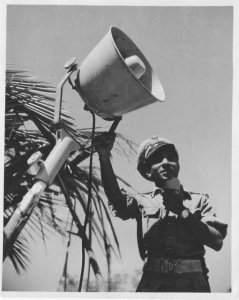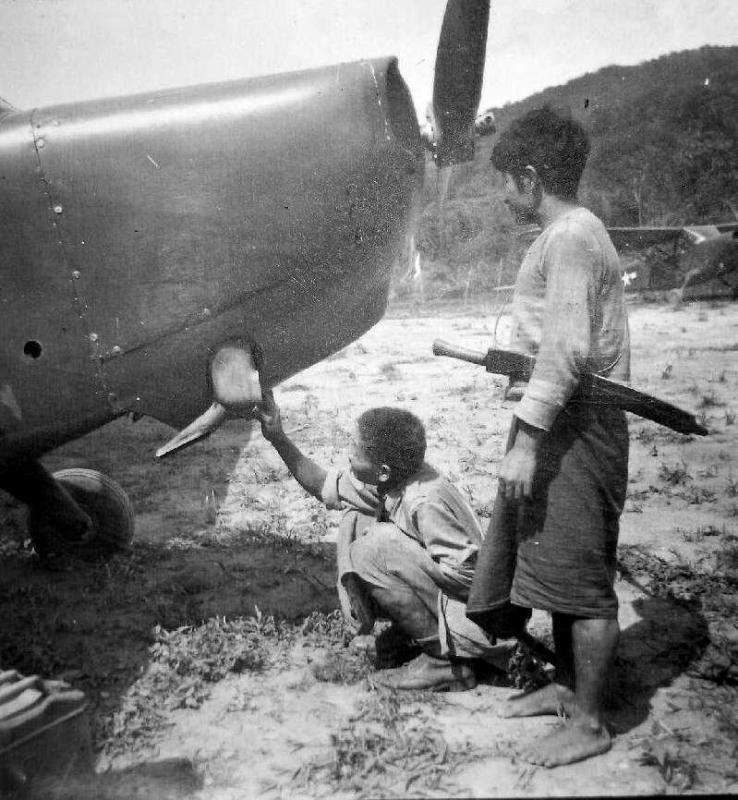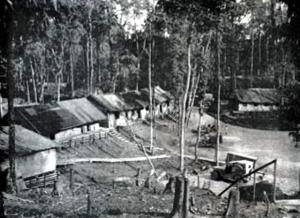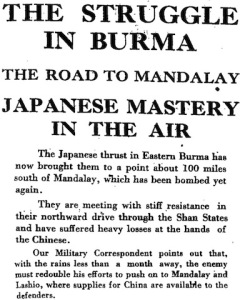I moved out into the Camp to assess the casualties and damage in order to organise the urgently required clearing up and rehabilitation of the severely depleted infra-structure so as to be able to cope with the fresh arrivals expected later in the day.

The immediate need, of course, was the removal and disposal of bodies and limbs before putrefaction set in under a hot sun.
Simultaneously, it was essential to collect vast number of belongings abandoned by the refugees as the bombs fell in order to prevent the danger of looting and thievery by the locals as well as the Camp inmates. This had to be organised before the initial shock and trauma had worn off. As I went round the Camp I found all those who had escaped injury going round in dazed groups trying to identify relations and friends among the bodies spread throughout the Camp.
The bombs made largish craters in the soft earth, up to 10’ in depth in some cases and almost 20’ in diameter. Dismembered limbs and tattered pieces of clothing littered the area presenting a ghastly sight. However, my immediate concern was to organise manual labour and I managed to persuade some of the refugees to help with the clearing up. The ‘Matron’ had wisely confined herself to her own basha hut having decided to take her chances there. Somewhat shaken, she put on a brave face and immediately produced a hot cup of tea with sweet condensed milk which, according to her, was the next best thing to a tot of brandy in these circumstances. It worked and I quickly explained to her my plan for cleaning up the Camp within the next 6 to 8 hours.
I have omitted to mention, in fact, the first thing we got organised was the shifting of the injured to the Field Hospital close by with the active help and whole-hearted cooperation from the Hospital staff. The ‘Matron’ took immediate charge on a no-nonsense basis and so leaving her there I decided to call on the Dist. Collector whose Office-cum-bungalow happened to be just a furlong or so down the road, to put him in the picture regarding casualties and ask for immediate help in the way of labour and tools to get on with the job. I was fully aware that with almost 10 large refuge camps spread around Imphal, most of which had been attacked by the Japanese that morning, he would have his hands full with similar demands for help.

As I got on the main road I realised for the first time the ferocity of the attack and the extent of damage – military and civil – caused by the morning’s work. The road was cluttered with a long line of Army trucks, some smouldering, others burning and still others completely shattered by bomb splinters and direct canon fire. I could also see a number of drivers slumped in their seats either dead or wounded. Saddest of all was the sight of a group of refugee women and children taking a lift in the trucks, mown down in the attack with just a few survivors. It was re-assuring to see the Army on the job of removing the injured and dealing with fires.
I found the DC, a young English ICS officer, in his office, introduced myself and we immediately got down to the business of listing our problems, priority-wise, and how we should go about tackling them in an even-handed fashion so that none of the Camps suffered. He met me most cordially and I discovered that the Agent had already spoken to him about me which made thing much easier. He assured me that he would let me have all the labour I needed from the two large ‘Road Construction’ Camps 3 miles away at the bottom of the hill. I needed 200 men and he readily agreed.
Since none of the other Camps-in-charge had arrived by then, we had a quick cup of tea and then walked down to ‘my’ Camp for him to get a clearer idea of conditions there. He was appalled by what he saw inside the Camp and on the road. He had only just returned to Headquarters from a tour and had heard the thunder of the bombs and roar of aircraft just a few miles outside Imphal and had no idea of the extent of damage and casualties till setting eyes on the carnage in what came to be known as the City Camp of which I happened to be in charge.
By the time we got there a couple of his Office assistants had also joined him and he dictated instructions on what was needed to be done. About half and hour later the ‘runner’ who had been sent to the Labour Camp below with instructions to bring one column of 200 men immediately, arrived with the news that most of the labour had scattered far and wide into the thickly-wooded country side after the bombing and were unwilling to work in the Town due to fear of further attacks. However, a more senior assistant was despatched with instructions not to return without at least 400 men since pressure had begun to build from other Camps. The Army had moved fast and tidied up the main road towing away the damaged vehicles for necessary repairs. All the bodies and severed limbs had been removed and covered with tarpaulin but we knew there was not much time left for their disposal before the stench became unbearable with its inevitable effect on morale. While the DC was in favour of mass burials, I suggested that we could also perhaps consider disposal by mass cremation provided he could arrange the necessary quantity of wood and petrol for the job. It was agreed that we should try both – burial and cremation – since the problem would apply to other Camps as well.
The City Camp had somewhere near 400 bodies to be disposed of and we would expect at least double that figure from the other camps (in total) though they had not received the same attention as meted out to City Camp.
In addition, the town itself had received several hits in residential and bazar areas causing some 100 deaths. It was about 2 p.m. by the time we finalised our plans. All this time, we had to be moving about with the other volunteers helping in search and collection not only of bodies but also odd items still lying around. Many of the bags contained cash and items of jewellery as also papers identifying the owners. I handed over almost 1,000 such bags etc. to the DC who agreed to retain them in safe custody for eventual return to bonafide claimants.
The Field Hospital manned by Army Medical Corps personnel was doing a remarkable job by taking on whoever required their help, sending the more serious cases to the Base Hospital just outside the Town.

We had also managed to contact the other officers in charge of Camps (ten of them) to convey the general pattern of action recommended for dealing with common problems – disposal of the dead, emergency hygiene and public health measures to control the outbreak of cholera and other diseases, treatment of drinking water. Cholera was our most dreaded concern and regular patrols were set up on a round the clock basis to identify and isolate any case which aroused the slightest suspicion for professional diagnosis after First Aid had been administered.
The DC’s labour force had done its job well completing two long trenches to serve as common grave for 200 odd bodies on a terrace half-way down the hill slope. The remaining bodies and what remained of them were taken further down the hill and given a solemn cremation in the presence of a fairly large gathering of locals and refugees. It was almost midnight by the time these chores had been completed, but there still remained the small matter of preparing the Camp for the fresh arrivals expected early the following morning.
The DC remained on the scene throughout, with periodic absences to deal with urgent matters in the office. The close inter-action throughout the day had established a sense of comradeship and I think, mutual respect. He went for a quick dinner about 8 o’clock and on his return some 30 minutes later, he brought a hamper consisting of boiled eggs, a flask of soup and sandwiches for my refreshment which touched me greatly. He was a bachelor and so the thought was his own. It was almost daylight by the time we completed our business and he asked me where I intended to spend the rest of the night. I took him to my basha, showed him the remains of the Agent’s pair of shorts and told him that I would be quite comfortable on the bunk. He would have none of it and insisted that I move in with him for a couple of days at least till things had settled down at the Camp.
I accepted the offer without demur and throwing everything into the ruck-sack was ready to move out. The Matron with a small staff would remain in charge for the rest of the night. As we walked back to his bungalow I could not hold myself from blurting out the one question which had been rankling in my mind all day – would the Japanese repeat the attack the next day as they had done on Rangoon and Mandalay. It had obviously been bothering him as well for the implications were disastrous. The Camps would empty out with the refugees thronging the roads and blocking Military traffic. Our medical resources had been stretched to breaking point and stocks of rice and other basic needs like salt had reached a critical low in the morning’s raid. Telegrams had been sent for replenishment of supplies but these would take a good week or more to arrive and there could be further losses. Just thinking and discussing the possibilities brought on a cold sweat of it from my mind. The young DC (I think the name was Roberts) just could not get off the subject and I could well appreciate the trauma he was going through. It was 2 a.m. by the time we got to the house and we sat up for another half-hour or so over a cup of coffee to discuss the morning’s schedule. I wanted to be at the Camp by 7 a.m. so he ordered breakfast for 6.30 and we turned in for what remained of the night.

